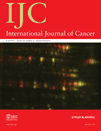Long term presence of a single predominant tyrosinase-specific T-cell clone associated with disease control in a patient with metastatic melanoma
Abstract
In an earlier study, we described a patient who developed an anti-tyrosinase T-cell response leading to long-term tumor control. Here we analyzed this response with regard to T-cell receptor (TCR) Vβ family usage and clonality in order to further elucidate the nature of the T cell response in this patient. For identification of expanded specific cytotoxic T-cell (CTL) clones, tetramer enrichment of tyrosinase reactive T-cells was followed by comparative quantitative reverse transcribed PCR (qRT PCR) quantification of all TCR Vβ-families and sequencing of family Vβ4 elevated in the enriched fraction. The predominant specific clone was quantified by clonotypic qRT PCR in multiple samples from blood, bone marrow, and tumor tissue. FACS analyses with staining of TYR.A2 and TCR Vβ4 were performed. Epitope specific enrichment revealed an isolated increase of Vβ−family 4. FACS analysis showed a shift of specific CTLs to Vβ-family 4 during tumor regression with a maximum of 80% of all TYR.A2 specific cells belonging to this family. Sequencing revealed a single predominant clone against polyclonal background coding for identical CDR3 loops. The predominant clone was highly expressed in bone marrow and tumor tissue, and was detectable in blood over a period of ten years. Considering the results of previous studies showing a specific effector phenotype in blood and a specific memory compartment in bone marrow of this patient, this data implicate the predominant clone featured all attributes of a sufficient CTL response including homing capacity and memory formation resulting in long term clonal persistence and tumor control.




